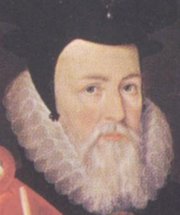William Cecil, 1st Baron Burghley
|
|
William Cecil, 1st Baron Burghley (13 September 1521–4 August 1598), was an English politician, the chief advisor of Queen Elizabeth I for most of her reign.
Cecil was born in Bourne in 1521, the son of Richard Cecil (owner of the Burghley estate, then in Northamptonshire), now in Cambridgeshire, and his wife Jane Heckington. The estate is today open to the public and is the setting for a popular equestrian event. Cecil was educated at Cambridge University and in 1547 was given a post in the household of King Henry VIII.
His early career was spent in the service of the Duke of Somerset (a brother of the late Queen Jane). When Somerset, a powerful figure during the reign of his nephew, King Edward VI, was disgraced and executed, Cecil lost his position but was soon restored and promoted, being knighted in 1550. He survived the reign of Edward's successor, Queen Mary I, by diplomatically adopting the Catholic faith, but it seems that he already recognised the potential of the Queen's younger sister, Elizabeth, whom he coached for the monarchy. When she came to the throne in 1558, she appointed him Secretary of State. In 1571, in anticipation of the impending marriage between Cecil's daughter Anne (b. 1556) to Edward de Vere, 17th Earl of Oxford, she created him Baron Burghley, and in 1572 named him Lord High Treasurer on the death of Lord Winchester.
Lord Burghley continued to hold the dominant position in Elizabeth's administration right up until his death in 1598 and contributed hugely to her success as Queen. His younger son, Sir Robert Cecil (later created Baron Cecil, Viscount Cranborne and finally Earl of Salisbury), inherited his political mantle, taking on the role of chief minister and arranging a smooth transfer of power to the Stuart administration under King James I. His elder son, Sir Thomas Cecil, who inherited the Barony of Burghley on his death, was later created Earl of Exeter.
| Preceded by: Unknown | Lord Privy Seal 1571–1572 | Succeeded by: The Lord Howard of Effingham | |||
| Preceded by: The Marquess of Winchester | Lord High Treasurer 1572–1598 | Succeeded by: The Earl of Dorset | |||
| Preceded by: Sir Francis Walsingham | Lord Privy Seal 1590–1598 | Succeeded by: Sir Robert Cecil
|

